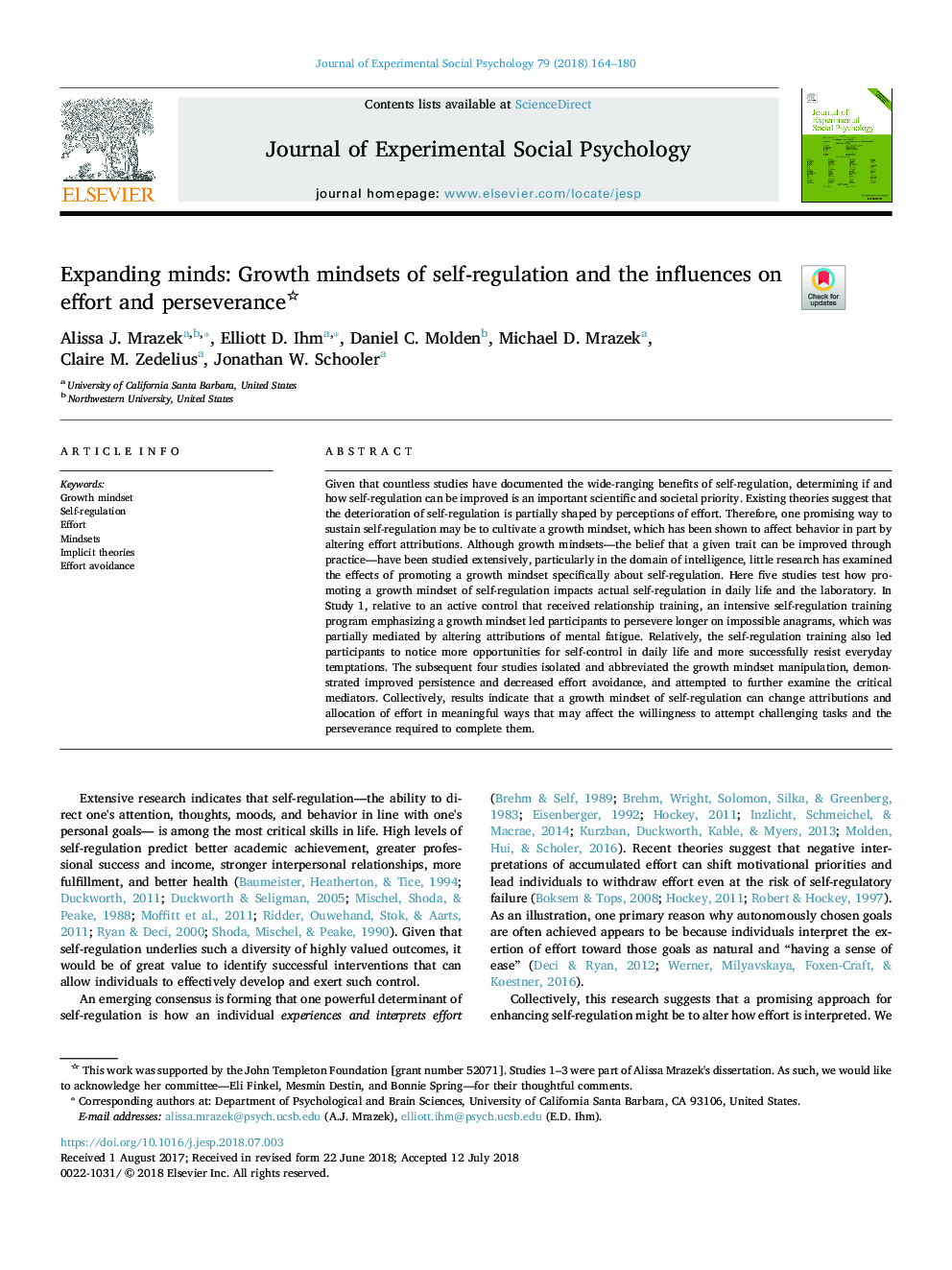| کد مقاله | کد نشریه | سال انتشار | مقاله انگلیسی | نسخه تمام متن |
|---|---|---|---|---|
| 7323954 | 1475844 | 2018 | 17 صفحه PDF | دانلود رایگان |
عنوان انگلیسی مقاله ISI
Expanding minds: Growth mindsets of self-regulation and the influences on effort and perseverance
ترجمه فارسی عنوان
گسترش ذهن: ذهنیت رشد خودارزیابی و تأثیر بر تلاش و استقامت
دانلود مقاله + سفارش ترجمه
دانلود مقاله ISI انگلیسی
رایگان برای ایرانیان
کلمات کلیدی
ترجمه چکیده
با توجه به این که مطالعات بی شماری مزایای فراگیر خودارزیابی را مستند کرده اند، تعیین اینکه آیا و چگونه می تواند خود تنظیم شود، اولویت مهم علمی و اجتماعی است. تئوری های موجود نشان می دهد که بدتر شدن خود تنظیم از طریق درک تلاش ها شکل می گیرد. بنابراین، یکی از روش های امیدوار کننده برای حفظ خودارضائی، ممکن است یک اندیشه رشد را پرورش دهد که نشان می دهد که با تغییر دادن نظرات کار بر روی رفتار تاثیر می گذارد. گرچه رشد ذهنیت - اعتقاد بر این است که یک ویژگی مشخص از طریق عمل بهبود می یابد، به طور گسترده مورد مطالعه قرار گرفته است، به ویژه در حوزه هوش، پژوهش کمی تحقیقاتی را انجام داده است که بر اهمیت تفکر رشدی بویژه در مورد خودمراقبت بررسی شده است. در اینجا پنج مطالعات نشان می دهد که چگونه ارتقاء اندیشه رشد خودارائال بر خودارایه سازی واقعی در زندگی روزمره و آزمایشگاه اثر می گذارد. در مطالعه 1، نسبت به یک کنترل فعال که آموزش ارتباط برقرار می کرد، یک برنامه تمرین خودکشی شدید با تاکید بر یک ذهنیت رشد، شرکت کنندگان را به اضطراب در غیر ممکن تبدیل کرد، که به طور جزئی با تغییر دادن ویژگی های خستگی ذهنی متمرکز بود. به طور نسبی، آموزش خودمراقبتی نیز باعث شد تا شرکت کنندگان فرصت بیشتری برای کنترل خود در زندگی روزمره داشته و با موفقیت بیشتر از وسوسه های روزمره مقاومت کنند. چهار مطالعه در ادامه، تفکر رشد ذهنی را به صورت جداگانه و مخفیانه نشان دادند، نشان دادند که پایداری بهبود یافته و کاهش اجتناب تلاش، و تلاش برای بررسی بیشتر میانجیگران انتقادی. به طور خلاصه، نتایج نشان می دهد که روحیه رشد خودکفایی می تواند نظرات و تخصیص تلاش را در روش های معنی دار تغییر دهد که ممکن است بر تمایل به انجام وظایف چالش انگیز و استقامت لازم برای تکمیل آنها تاثیر بگذارد.
موضوعات مرتبط
علوم زیستی و بیوفناوری
علم عصب شناسی
علوم اعصاب رفتاری
چکیده انگلیسی
Given that countless studies have documented the wide-ranging benefits of self-regulation, determining if and how self-regulation can be improved is an important scientific and societal priority. Existing theories suggest that the deterioration of self-regulation is partially shaped by perceptions of effort. Therefore, one promising way to sustain self-regulation may be to cultivate a growth mindset, which has been shown to affect behavior in part by altering effort attributions. Although growth mindsets-the belief that a given trait can be improved through practice-have been studied extensively, particularly in the domain of intelligence, little research has examined the effects of promoting a growth mindset specifically about self-regulation. Here five studies test how promoting a growth mindset of self-regulation impacts actual self-regulation in daily life and the laboratory. In Study 1, relative to an active control that received relationship training, an intensive self-regulation training program emphasizing a growth mindset led participants to persevere longer on impossible anagrams, which was partially mediated by altering attributions of mental fatigue. Relatively, the self-regulation training also led participants to notice more opportunities for self-control in daily life and more successfully resist everyday temptations. The subsequent four studies isolated and abbreviated the growth mindset manipulation, demonstrated improved persistence and decreased effort avoidance, and attempted to further examine the critical mediators. Collectively, results indicate that a growth mindset of self-regulation can change attributions and allocation of effort in meaningful ways that may affect the willingness to attempt challenging tasks and the perseverance required to complete them.
ناشر
Database: Elsevier - ScienceDirect (ساینس دایرکت)
Journal: Journal of Experimental Social Psychology - Volume 79, November 2018, Pages 164-180
Journal: Journal of Experimental Social Psychology - Volume 79, November 2018, Pages 164-180
نویسندگان
Alissa J. Mrazek, Elliott D. Ihm, Daniel C. Molden, Michael D. Mrazek, Claire M. Zedelius, Jonathan W. Schooler,
